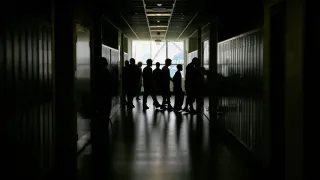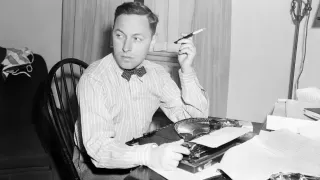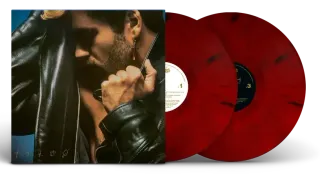June 3, 2023
June Bugs: The Lavender Tube on Pride Programs, Pickets, & Comedies
Victoria A. Brownworth READ TIME: 7 MIN.
It's Pride Month! Happy 'What has the GOP done to take away more of our rights' month! Cue sarcasm font as we await the excitement of which stores we can't shop in any more (We'll miss you, Target!), which beer we can't drink any more (We never liked you, Bud Light!) and which politician will throw us under the bus next (Way to besmirch your father's name, Robert F. Kennedy, Jr.).
Pride is further complicated for those of us looking forward to a June filled with TV shows designed just for us. As series finales slam up against the ongoing writers' strike that no one talks about like it's not even happening, expect more reality TV shows to flood the airwaves. Dating shows, cooking shows – anything that doesn't really require a writer.
The 2023 Writers Guild of America (WGA) strike is an ongoing labor dispute between the WGA labor union, representing 11,500 writers, and the Alliance of Motion Picture and Television Producers. It began May 2. It already almost killed the Tony Awards and all of late-night talk shows.
Some series and specials pre-date the strike and were prepped to go, but expect to shell out more money for various streaming services as the summer heats up, due to the strike. It's frankly shocking and gross that absolutely nothing has moved on the strike in a month, and worse, that there are so many rumors about using AI to replace writers.
Here's a good explainer about what's happening and what it means for viewers like us.
So what can we watch in June? Netflix says, come on over for their Pride Month line-up. "There's no better way to spend June than with our Pride Month collection, which features amazing shows, movies and specials for, by and about the LGBTQ community."
That includes LGBTQ stories, critically acclaimed LGBTQ movies and TV shows, LGBTQ directors, GLAAD Award nominees, LGBTQ stories for families, and LGBTQ documentaries. It's a pretty wide-ranging group of shows and films. You could spend the whole month there and be happy.
www.netflix.com
The Ultimatum: Queer Love
Tie the knot or call it quits? Five long-term couples – all queer women and nonbinary people – are put under pressure to get married or move on in this queer-centric spin-off of "The Ultimatum." The couples must work out, on camera, their conflicting feelings about marriage while simultaneously assessing the other participants for romantic potential by going into trial relationships with them.
Oh yes, it's like that. If it sounds like a deliciously hot mess, it is. It's also so laden with easy spoilers, all we can say is, once you start watching, you won't be able to quit; on Netflix. Go get it.
Casa Susanna
For Pride, PBS has the outstanding "Casa Susanna" documentary from their "The LGBTQ+ Experience Collection."
"Casa Susanna" is a groundbreaking story of a secret community, written and directed by Sébastien Lifshitz. As PBS describes it: "In the 1950s and '60s, an underground network of transgender women and cross-dressing men found refuge at a modest house in the Catskills region of New York. Known as Casa Susanna, the house provided a safe place to express their true selves and live for a few days as they had always dreamed – dressed as and living as women without fear of being incarcerated or institutionalized for their self-expression."
"Casa Susanna" is "told through the memories of those who visited the house," and "the film provides a moving look back at a secret world where the persecuted and frightened found freedom, acceptance and, often, the courage to live out of the shadows."
Using a rich trove of color photos of Casa Susanna's guests, archival footage and personal remembrances, the film introduces Diana and Kate, two people whose lives were forever changed at Casa Susanna. They travel back to the now-abandoned site and share their memories of a time when people like them, from all over the country, came to a place where they were free to dress and live as women from morning to night. They found each other and the refuge of Casa Susanna through word of mouth and Transvestia, a magazine for and by the trans and cross-dressing community.
The film also recounts the forgotten life of Susanna Valenti, the courageous woman who ran the house. From her enlistment in the army as a man to her marriage to Marie, an eccentric older Italian woman, Susanna led a life that, even today, many would find hard to imagine. Like Susanna, many who came to the Catskills house had ordinary jobs, were in heterosexual marriages, and had fathered children.
Also featured is Betsy Wollheim, who discovered after her father's death that he was a regular visitor. Gregory Bagarozy, Marie's grandson, shares warm memories of unconventional summers at his grandmother's home. Together, their stories provide a fascinating and moving look at a forgotten moment in queer history.
"I have been lucky enough to be able to bring this secret history, this invisible world, back to life with the help of Kate, Diana, Betsy, and Gregory," says Lifshitz. "Now their story, the story of this clandestine community, is there for all to see. The unsettled nature of their existences and their bravery ring loud and clear."
Executive Producer Cameo George said, "People think that the transgender movement is something very new, but that is because queer history has been marginalized and hidden for so long. This film, in a beautiful and touching way, brings an important chapter of that history to light, confirming that this community is, and has been, a part of the American story."
With lush cinematography by Paul Guilhaume, the documentary is a history we have not seen previously. The memories of those who visited the house, where they found the freedom and acceptance they needed to live the lives they always dreamed of, are incredibly poignant. Beautiful, heartbreaking, "Casa Susanna" is must-see programming. June 27, on PBS or watch online.
Smothered
This irreverent dark comedy is not for everyone, but it is fast and dirty and often hilarious, and with very short episodes you can decide quickly whether you want to play with it or not.
"Smothered" is described by creators Jason Stuart and Mitch Hara as "an hysterical and sobering look at a hateful, gay, Jewish middle-aged couple who can't stand each other, but can't afford to get divorced. The 'boys' attempt to salvage their hideous relationship in therapy hell. It's a hysterical, touching, psychotic exploration of love, crashing to bits like cheap china from the Olive Garden. It's also a celebration of diversity, Little People, transsexuals, Asians, Blacks, Whites, Jews, Closet Cases and a fluid dog."
Season One of "Smothered" relied on the handy device of Hara and Stuart's bickering couple going to a different couples counselor every five or six-minute segment. Season Two opens things up, ushering in a slate of recurring secondary characters, including mobbed-up family members, a lesbian mother, a formidable warden at a halfway house, and even a sexy "plumber."
"Smothered" was named "One of the best comedy series" by Amazon for their first season, and was nominated for the Spotlight Award at the Indie Series Awards. Stuart is an actor, comedian and activist with over 150 film and TV credits. In 2022 Stuart was named one of Out Magazine's OUT 100 and won Best Actor in a Comedy Series for "Smothered's" first season by the Indie Series Awards. Hara is a graduate of the acclaimed Actor's Studio in New York, and has appeared on numerous film and television series.
"Smothered" Seasons 1 and 2 are now streaming on Revry and are available on YouTube and Amazon Prime; with Amanda Bearse, Jai Rodriguez, and Carole White, and directed by Carlyle King.
So for the romantic, the edgy, the sexy and the history – always the history – you know you really must stay tuned.
Help keep the Bay Area Reporter going in these tough times. To support local, independent, LGBTQ journalism, consider becoming a BAR member.






